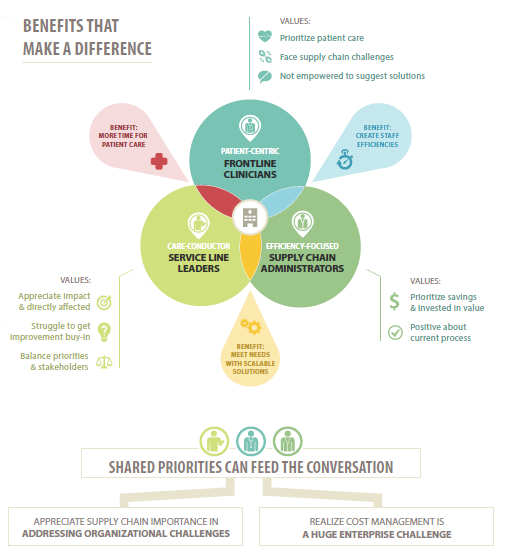We recently surveyed more than 400 hospital staff, including nurses, physicians, service line leaders and supply chain administrators, to understand how the supply chain affected their day-to-day work. We learned that these colleagues shared some fundamental goals, but each held different views about supply chain challenges and needs.
To paint a complete picture of the importance of the supply chain, we studied how it affects each group and what each group needs from it. Everyone appreciates the impact the supply chain has on quality of care, cost management and patient experience. But they may not know how to make a change for improvement. Not surprisingly, a person’s role in a hospital informs his or her belief of what a successful supply chain can help accomplish.
The graphic below outlines survey findings around each stakeholder’s role and needs and where there is opportunity to more clearly align these stakeholders around creating helpful efficiencies with an automated supply chain that benefits everyone.

To align all stakeholders, it’s critical to work together to make improvements that meet everyone’s needs and support the hospital’s overall vision. The VP of supply chain is in a unique position to facilitate conversations with all stakeholders. By understanding what each stakeholder values most, supply chain leaders can adjust their approach to help their colleagues realize the tangible benefits supply chain improvements can bring. For frontline providers, that’s improving patient care, and for service line leaders, that’s a combination of patient care and managing costs.

No matter where you sit, you have the power to start a conversation that could increase efficiencies and give everyone at your hospital time back to do what they do best. Curious about where your inventory management practices currently stand? Take this quiz by Cardinal Health to find out and use the results to start a conversation that can support improved quality of care.
Visit here for more resources on supply chain.
About Cardinal Health Hospital Supply Chain Survey
This study was fielded Oct. 19 - Nov. 4, 2016, using an online survey methodology. The samples were drawn from SERMO’s Online Respondent Panel of Health Care Providers, which includes over 600,000 medical professionals in the United States. The study included 403 respondents total, including frontline healthcare providers in hospitals (n=201), service line leaders in hospitals (n=100) and hospital/supply chain administrators (n=102). All survey data on file at Cardinal Health.


